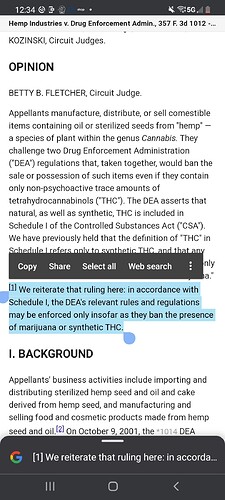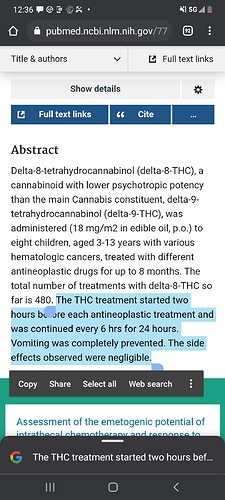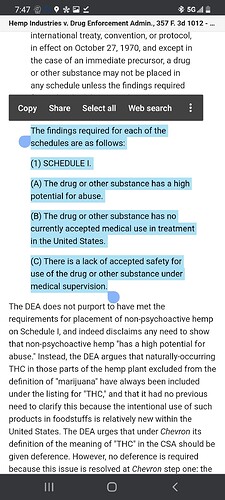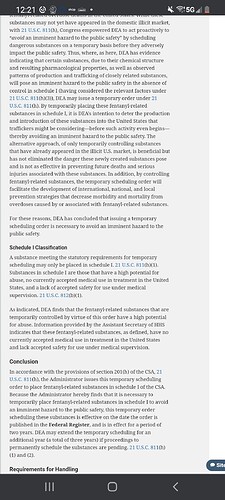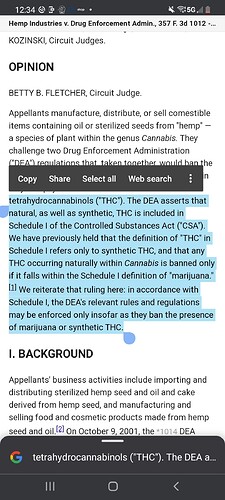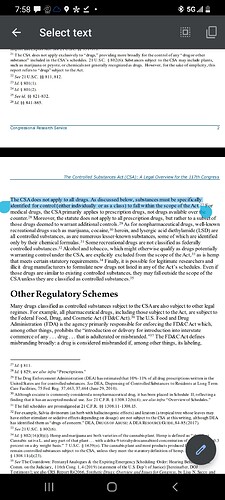You do realize WHO has a much bigger role in scheduling then the HHS.
If the DEA had there way hemp seeds would have been included too but the courts ruled against them
You realize the ppl going after the DEA on the d8 issue are the same group who won that hemp seed suite against the DEA
They’re 1/1 against the DEA
And that does bring hope of further success. But it is important to anticipate and understand the arguments your opponent will use.
By the way, I was not aware. Which group? The HIA as in the starting topic of this post?
I do think this will be a more difficult issue to resolve, however, due to the uncertainty around if the process of converting CBD to d8 can be counted as being “derived”.
Synthetic equivalents of THC and MJ are banned, no other cannabinoid except the 2 other I listed are scheduled
Yea man
Why do you think they say d8 is legal?
At that point the argument goes to if d8 from hemp CBD counts as synthetic or derived. So I am convinced that it comes down to that rather than being impossible to have a loophole to start. If d8 could be extracted from hemp without conversion in viable quantities, there would be no argument. It’s the process that brings things into question. Not only on the definition sense but the end products as well, given how hard it is to make pure, compliant d8.
By the way, I would like an answer to this question from you, and the inverse from @bio_stimz
To @Kingofthekush420 , would D8 derived from marijuana rather than hemp be considered a Schedule 1 substance?
To @bio_stimz if d8 were to theoretically occur in viable quantities in the hemp plant, while remaining under the specified 0.3% d9 for the definition of hemp set, would you believe there to be the potential of a loophole? Or do you believe that the substance, being psychotropic, inherently must be schedule 1 regardless of the source? If so, to this effect, how does one reconcile the wording of the hemp exception to drug code 7370 with this interpretation, in the light of cases such as the one @Kingofthekush420 references in regards to hemp seeds? In this case, why is d8 different from the d9 in hemp seeds?
I’m hoping to get a better idea from both parties in these regards.
To initiate a schedule, the DEA first asks if a drug can be abused. If the answer is yes, then it’s put on a schedule. If no, the drug is left out. After that, the drug’s medical value and relative potential for abuse are evaluated to decide where on the scale it lands.
The two big issues, then, are a drug’s potential for abuse and its medical value. Congress did not clearly define abuse under the Controlled Substances Act. But for federal agencies responsible for classifying drugs, abuse is when individuals take a substance recreationally and develop personal health hazards or pose other risks to society as a whole. To find medical value, a drug must have large-scale clinical trials to back it up — similar to what the Food and Drug Administration (FDA) would expect from any other drug entering the market.
Congress could pass a law that changes or restricts a drug’s schedule. But Congress mostly leaves scheduling to federal agencies like the DEA. (One exception: Congress previously passed the Hillory J. Farias and Samantha Reid Date-Rape Prevention Act of 2000 and added gamma hydroxybutyric acid, a date rape drug, to the scheduling system.)
The US attorney general can also initiate a review process that would look at the available evidence and potentially change a drug’s schedule. The review includes several steps:
- The DEA, US Department of Health and Human Services, or public petition initiate a review.
- The DEA requests HHS to review the medical and scientific evidence regarding a drug’s schedule.
- HHS, through the FDA, evaluates the drug and its schedule through an analysis based on eight factors. Among the factors: a drug’s potential for abuse, the scientific evidence for a drug’s pharmacological effects, and the scientific evidence for a drug’s medical use.
- HHS recommends a schedule based on the scientific evidence.
- The DEA conducts its own review, with the HHS’s determination in mind, and sets the final schedule.
Although very rigorous, this process has been successfully carried out in the past. For example, the DEA in 2014 announced it had rescheduled hydrocodone combination products, or opioid-based prescription painkillers, from schedule 3 to schedule 2.
… edit
this guy sciences ![]()
Yeah, I think I have a pretty good idea where my citations originate from herp derp. SAR data isn’t biased. Do you need more related citations?
You’re the one who made the foolish statement that “D8 hasn’t been evaluated for is psychoactive which is why it SPECIFICALLY isn’t scheduled when it’s derived from hemp.” … when in reality there have been numerous structure-activity relationship studies that have been conducted on Delta-8. I just presented two of various citations that prove your statement was false.
Wrong, nice try though;
As per 21 U.S.C. §802(32)(A), the term “controlled substance analogue” means a substance— (i) the chemical structure of which is substantially similar to the chemical structure of a controlled substance in schedule I or II; (STRIKE 1 → Delta-8 from hemp is structurally IDENTICAL to DEA controlled substance #7370) which has a stimulant, depressant, or hallucinogenic effect on the central nervous system that is (substantially similar to) or greater than the stimulant, depressant, or hallucinogenic effect on the central nervous system of a controlled substance in schedule I or II (STRIKE 2 → Delta-8 from hemp elicits the EXACT same pharmacodynamic effects that DEA substance #7370 does).
You’ve got a long way to go if you think you’re going to be able to pull weak-ass nonsense like that on me lol. I realize that you are attempting to convince yourself that I’m some fool who doesn’t know what he’s talking about, but I will slay you when it comes to anything relating to physiology, pharmacokinetics, pharmacodynamics and peer-reviewed research, so feel free to test my knowledge.
STRIKE 3 → Number one; Delta-8 (already) acquires a high potential for abuse with no currently accepted use in disease treatment - hence why it’s a Schedule I/CSA substance #7370.
Number two; Investigational drugs are irrefutably not accepted for use in disease treatment, as they are not FDA-approved.
Next?
can i ask what you’re on? feels like viagra for badass debating skills
I’m going to guess lisdexamfetamine based on the persistent beating of this pointless drum.
Delta-8 suppositories
The heroic maker of literal “poop soup”!
Coming soon to a gas station near you.
Real talk though, I must give credit where it is due, @bio_stimz response there was surprisingly compelling, to the point where I wonder if I myself may not be asking the right questions. At the very least, this is someone who will do their homework if challenged to do so, and do it well. Who would prevail? I’m back to not knowing, though the momentum may have changed.
I wonder how this might go in other exchanges, as moot as the whole debate is at the end of the day.
Thank you for the kind words. Sincerely.
Damn it, I just realized this could have been made into a joke about hemp derived Viagra. Then I could make another @Killa12345 reference.
I’m always one to repeat tired jokes and bring that horse to a pulp.
D8 isn’t scheduled ONCE AGAIN d9 is and d8 is illegal because of the AA which doesn’t apply to hemp because the CSA doesn’t
Here’s a list of the banned thcs, D8 isn’t one of them
This is directly from the CSA btw
Notice where it says
D8s effects aren’t substantially similar to d9 OR greater this is why they can give it to kids without the Psychotropic effects
You are a fool that doesn’t know what he’s talking about, you came in here arguing with me without even know the definition of hemp
![]()
![]()
![]()
Here’s a court case where the court states what’s needed for a substance to be scheduled in schedule 1
Here’s also where they state it in the emergency fentanyl scheduling
ONCE AGAIN
The DEA can only ban Synthetic thcs and THCs from MJ not hemp derived
How do you not see the drug code for THCs is exempt from hemp?
I’m guessing you’re gonna say something dumb now about how my source is inaccurate I’m guessing?
Holy shit! I think I actually get it now! I get the argument! When I’m not high I might doubt it again, but right now, I can see how that court decision reinforces the protections to hemp products, which is why people felt comfortable enough to make use of the perceived loophole, making it an actual one.
At least, until something comes naturally to disrupt it.
But I think I understand it better now.
For the lack of psychotropic effect, not sure I can agree still based off of my own experiences so far (but who knows how true my experiences have been?), but I could see it having a much lower effect when the effective dosage for anti-emetic is reached due to tolerance and the like.
You’re definitely wrong about drug scheduling and the cannabimimetics/synthetic thc. See the post above about scheduling, and
I realize your question is theoretical, but I must take this opportunity to be definitive in an effort to make things abundantly clear, as this is not a matter of opinion.
From a production standpoint it, it is literally impossible to acquire viable quantities of Delta-8 from hemp. This is due to the fact that the quantities of Delta-9 are borderline non-existent, as a result of the non-psychotropic 0.3% THC threshold and Delta-8 is merely an artifact of Delta-9 degradation, as it is not biosynthesized by the plant. The lower the Delta-9 concentration - the lower the Delta-8 concentration will be. As an example, there have been studies conducted on 0.3% hemp where the Delta-8 concentrations averaged 00.1% (when detected at all).
The only possibility for a legal loophole would be strictly ascribed to the amounts of Delta-8 found within any given hemp sample of less than 0.3% THC → and those amounts would be so utterly negligible (if even present in the first place), that you couldn’t call that a viable loophole at all. Once the level of THC exceeds 0.3% … the cannabinoid in question is inherently considered psychotropic and becomes a Schedule I-controlled substance by default.
The DEA is required to adhere to the CSA and maintain consistency with international treaty obligations pertaining to psychotropic substances. Under the scope of those reqquirements, (excluding psychotropic substances for scientific research purposes and medical product development) -all- psychotropic substances MUST be prohibited from being introduced into interstate commerce, irrespective of source. There are no exceptions, as the entire scope of the CSA and aforementioned treaties would be out the window.
Since cannabis seeds do not biosynthesize THC, any THC that could (potentially) be quantified, would be a result of surface contamination by insufficient cleaning methods. As such, the THC levels would be ridiculously negligible and more importantly; non-psychotropic. This is why the DEA cannot regulate cannabis seeds as a Schedule I.
